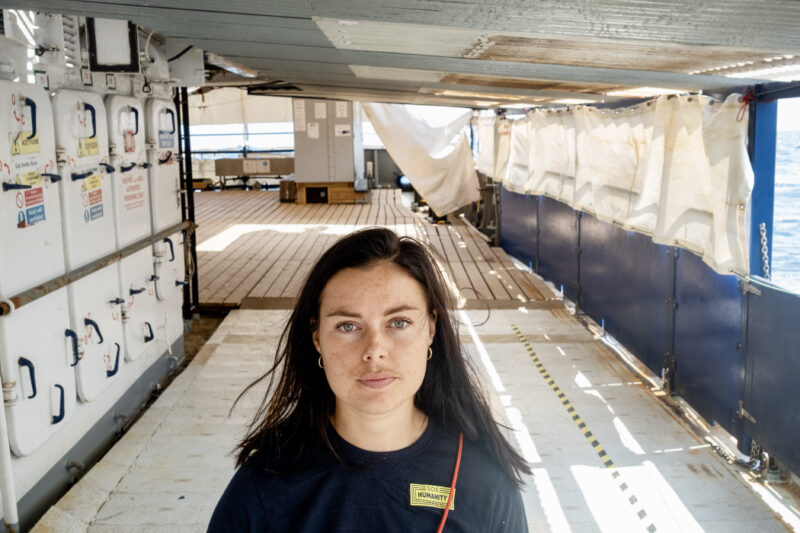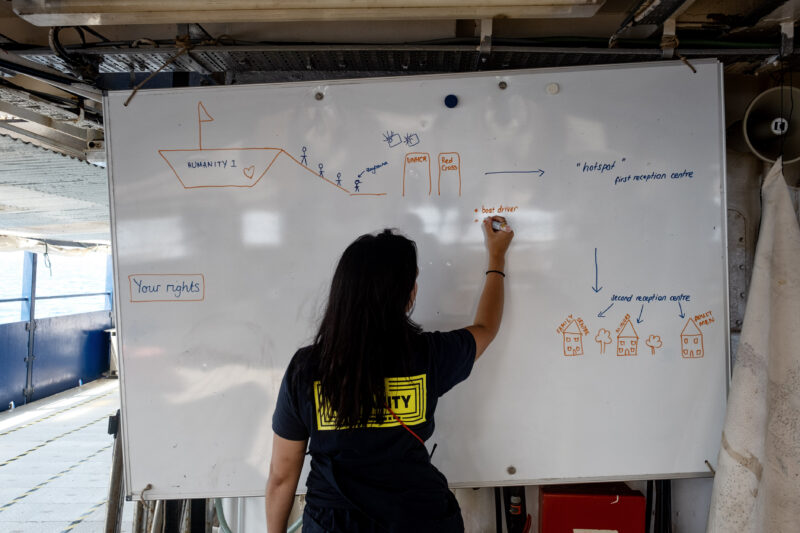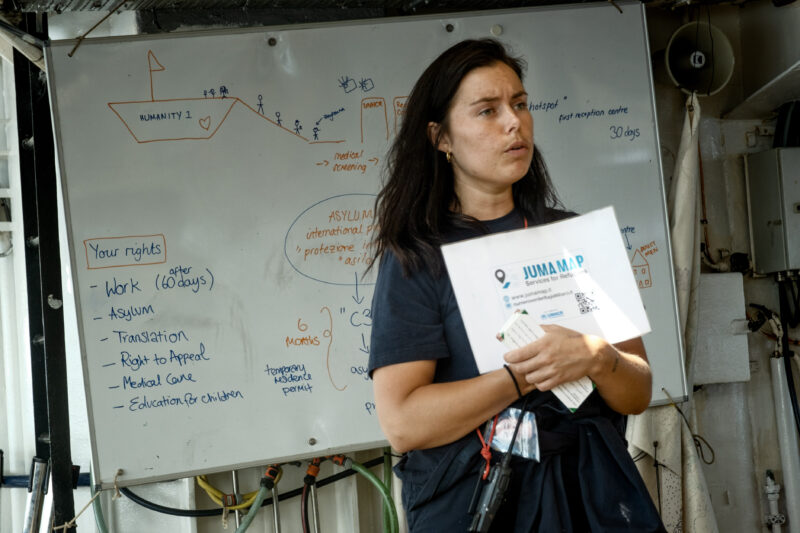“I demand an end to state produced violence!” Interview with Olive, Protection Representative

Olive is Protection Reprensentative on board the Humanity 1. As such her main activities on board are the registration of rescued people, managing our referral processes to land and information sharing with those rescued aiming to help finding their way in a foreign country. We talked about her experiences as a woman working in a male-dominated environment and why in her opinion the EU is indeed doing more than just standing idly by while thousands of people are drowning in the Mediterranean.
What is the job of the Protection Representaive on board about?
The idea is to make the gap between the life aboard and the new life on land as small as possible. I love the different translated sessions alongside our Cultural Mediator during which we share information with the survivors. I try to give the best overview that I can about the disembarkation process and the asylum process in Italy. I also make sure people know their rights in Europe – something as simple as knowing you have the right to translation can make a huge difference.

Besides that, what other possibilities do you have to support people in their start in Europe?
The other side of trying to create a bridge between the ship and the land is our referral processes. They are basically two pronged, covering family reunification and humanitarian referrals. With the support of our partner organisations onshore, including the UNHCR and the Red Cross, we are able to link people to the services that they need and have a right to access. This is especially relevant for any vulnerabilities that are identified while the survivors are on board. Such vulnerabilities could include sexual or gender-based violence, trafficking, kidnapping, experiences of recent violence and medical cases. In all these instances, people have the right to receive specialised care and assistance as well as extra support through their asylum process.
Family reunification is obviously also incredibly important to the rescued people. Our largest “sub-group” of people onboard are usually unaccompanied minors. The reunification process is especially critical here as it impacts where their asylum proceedings take place. We can initiate the very first stage of this onboard with a referral to our partner onshore.
What motivates you to be part of SAR?
Before first coming onboard, I had been following the work of civilian search and rescue vessels for years. All the time I have been astounded by the audacity of Europe that not only refuses to carry out search and rescue on the deadliest migration route on earth, but that also is actively criminalising the work of search and rescue organisations. It’s a surreally dark situation.
It is a brutal picture of inequality in today’s world and of how fatally embedded racism is in European politics and thoughts. Moving across a watery grave of Europe’s own making shows our hyper-mobility and hyper-privilege. The shipwreck outside Pylos, Greek, from which the death toll could be well over 500 lives, is the darkest reminder of the need for safe passage now.
I was offered the position as Protection Representative onboard for the second rotation of the Humanity 1 last year. I am now onboard for my third rotation in this role and have otherwise supported the ship and others of the civil fleet with logistics from the shipyard in Burriana.
What is it like to work as a woman in the mostly male-dominated maritime environment?
As a female seafarer, it is amazing to be part of a ship’s crew which is so different to the crews I have been part of before. I am used to seeing only a few women onboard, and the few of us are for the most part contained to very particular roles. When a woman was on the bridge doing something other than cleaning, it was like the Red Sea had been parted. On Humanity 1, often there’s nearly 50% women onboard, and we are across every department – bridge, engine, deck, SAR and care. It’s so strengthening to be part of that crew.

What is humanity for you?
Empathy. Solidarity. Building longer tables and smashing walls and fences.
Do you have political demands or wishes you’d like to express about the situation on the Mediterranean?
For me it is impossible to do this work without political demands.
Europe is actively pursuing hard-line, far-right migration policies. It is these policies that actually produce, that create violence and death at border spaces and within states. I demand an end to this state produced violence!
The Missing Migrants project documents over 56,900 dead or missing people since 2014. And the numbers we have are likely to be hugely underestimated. These fatalities that we see in the Mediterranean are not a given. It is not a fact of life, that just because people are crossing the sea, some will die. We do not have the reams of international maritime conventions to allow this to happen. These fatalities and other instances of violence such as illegal pushbacks to Libya happen because Europe says no to safe passage. They happen because Europe outsources and externalises its human rights obligations at every single turn. They happen because Europe values some lives more than others. I demand safe passage now and the end of Europe’s financial and material support of illegal pushbacks by the so-called Libyan Coastguard.
Europe must ensure human rights at its borders, on sea and on land. The recent negotiations about reforms of the Common European Asylum System basically render a member state’s asylum system non-functional with the introduction of a screening procedure at the border. This de-facto abolishes the individual right to asylum in Europe.
I demand that Europe respects the human rights instruments it has signed and ensures the welcome and protection of all people on the move.


